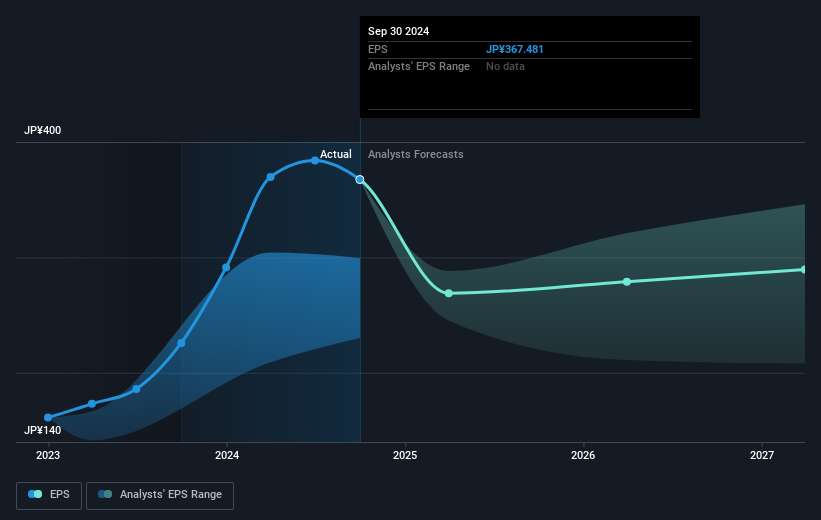- Japan
- /
- Electrical
- /
- TSE:6674
Earnings grew faster than the 23% return delivered to GS Yuasa (TSE:6674) shareholders over the last year

GS Yuasa Corporation (TSE:6674) shareholders might be concerned after seeing the share price drop 11% in the last quarter. But looking back over the last year, the returns have actually been rather pleasing! After all, the share price is up a market-beating 20% in that time.
Although GS Yuasa has shed JP¥15b from its market cap this week, let's take a look at its longer term fundamental trends and see if they've driven returns.
See our latest analysis for GS Yuasa
While the efficient markets hypothesis continues to be taught by some, it has been proven that markets are over-reactive dynamic systems, and investors are not always rational. By comparing earnings per share (EPS) and share price changes over time, we can get a feel for how investor attitudes to a company have morphed over time.
During the last year GS Yuasa grew its earnings per share (EPS) by 63%. It's fair to say that the share price gain of 20% did not keep pace with the EPS growth. Therefore, it seems the market isn't as excited about GS Yuasa as it was before. This could be an opportunity. This cautious sentiment is reflected in its (fairly low) P/E ratio of 7.06.
The graphic below depicts how EPS has changed over time (unveil the exact values by clicking on the image).

We know that GS Yuasa has improved its bottom line lately, but is it going to grow revenue? If you're interested, you could check this free report showing consensus revenue forecasts.
What About Dividends?
It is important to consider the total shareholder return, as well as the share price return, for any given stock. The TSR is a return calculation that accounts for the value of cash dividends (assuming that any dividend received was reinvested) and the calculated value of any discounted capital raisings and spin-offs. So for companies that pay a generous dividend, the TSR is often a lot higher than the share price return. As it happens, GS Yuasa's TSR for the last 1 year was 23%, which exceeds the share price return mentioned earlier. And there's no prize for guessing that the dividend payments largely explain the divergence!
A Different Perspective
We're pleased to report that GS Yuasa shareholders have received a total shareholder return of 23% over one year. That's including the dividend. Since the one-year TSR is better than the five-year TSR (the latter coming in at 3% per year), it would seem that the stock's performance has improved in recent times. Someone with an optimistic perspective could view the recent improvement in TSR as indicating that the business itself is getting better with time. I find it very interesting to look at share price over the long term as a proxy for business performance. But to truly gain insight, we need to consider other information, too. For example, we've discovered 2 warning signs for GS Yuasa (1 is concerning!) that you should be aware of before investing here.
If you are like me, then you will not want to miss this free list of undervalued small caps that insiders are buying.
Please note, the market returns quoted in this article reflect the market weighted average returns of stocks that currently trade on Japanese exchanges.
New: Manage All Your Stock Portfolios in One Place
We've created the ultimate portfolio companion for stock investors, and it's free.
• Connect an unlimited number of Portfolios and see your total in one currency
• Be alerted to new Warning Signs or Risks via email or mobile
• Track the Fair Value of your stocks
Have feedback on this article? Concerned about the content? Get in touch with us directly. Alternatively, email editorial-team (at) simplywallst.com.
This article by Simply Wall St is general in nature. We provide commentary based on historical data and analyst forecasts only using an unbiased methodology and our articles are not intended to be financial advice. It does not constitute a recommendation to buy or sell any stock, and does not take account of your objectives, or your financial situation. We aim to bring you long-term focused analysis driven by fundamental data. Note that our analysis may not factor in the latest price-sensitive company announcements or qualitative material. Simply Wall St has no position in any stocks mentioned.
About TSE:6674
GS Yuasa
Engages in the manufacture and sale of batteries, power supplies, lighting equipment, and other battery and electrical equipment in Japan, the rest of Asia, North America, Europe, and internationally.
Flawless balance sheet with solid track record.
Market Insights
Community Narratives




